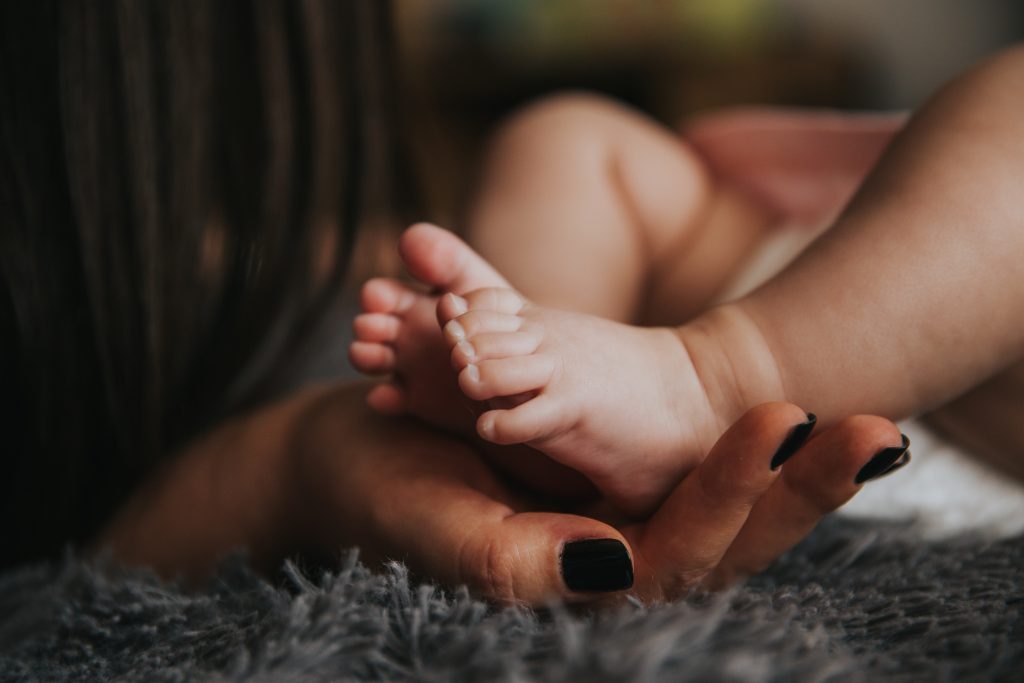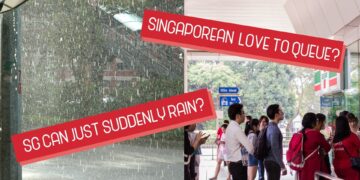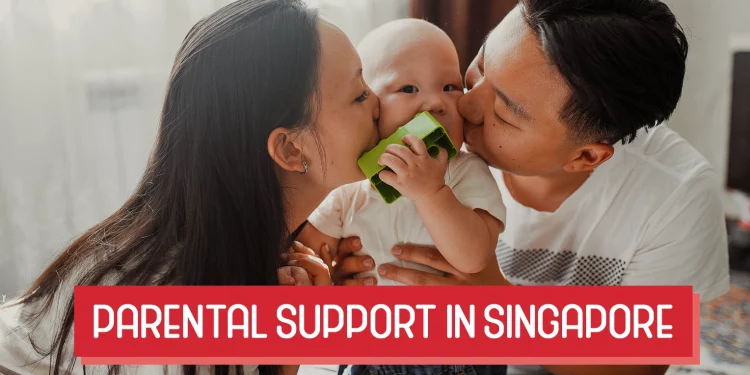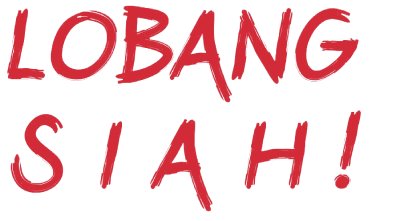Government programs and initiatives dedicated to assisting parents and families in Singapore provide extensive parental support. Support and assistance are provided through these initiatives to ensure that parents have access to the resources they need to raise a family. A few of these supports include:
(1) Baby Bonus Scheme
Manage the costs of raising a child with the Baby Bonus Scheme. Baby Bonus Cash Gifts and Child Development Accounts- special co-savings schemes for your children. The Child Development Account has two components, the First Step Grant and Government co-matching. In the Baby Bonus Scheme, eligible children born after 14 February 2023 have been enhanced.
Birth order | Baby Bonus Scheme (enhanced) | ||
Baby Bonus Cash Gift | Child Development Account (for approved uses, such as healthcare and preschool fees) | ||
First Step Grant | Maximum Government co-matching | ||
1st Child | $11,000 (+$3,000) | $5,000 (+$2,000) | $4,000 (+$1,000) |
2nd Child | $5,000 (+$2,000) | $7,000 (+$1,000) | |
3rd Child | $13,000 (+$3,000) | $5,000 (+$2,000) | $9,000 |
4th Child | $5,000 (+$2,000) | $9,000 | |
5th & Subsequent Child | $5,000 (+$2,000) | $15,000 | |
To find out more about the Baby Bonus Cash Gift, please visit https//go.gov.sg/bbo.
To determine your eligibility for the cash gift, you can check at https://www.babybonus-eservices.msf.gov.sg/parent-helper.
(2) Child Development Account
Current Disbursement Schedule and Quantum | New Disbursement Schedule and Quantum | |||
Children in the 1st and 2nd birth order | Children in the 3rd and subsequent birth order | Children in the 1st and 2nd birth order | Children in the 3rd and subsequent birth order | |
At birth | $3,000 | $4,000 | $3,000 | $4,000 |
6 months | $1,500 | $2,000 | $1,500 | $2,000 |
12 months | $1,500 | $2,000 | $1,500 | $2,000 |
15 months | $1,000 | $1,000 | – | – |
18 months | $1,000 | $1,000 | $1,000 | $1,000 |
2 years until 6.5 years | – | +$400 every six months | +$400 every six months | |
Total | $8,000 | $10,000 | $11,000 (+$3,000) | $13,000 (+$3,000) |
These figures reflect those post-enhancement, with parentheses showing changes from the existing quantum. Payment for the BBCG enhancements will begin in early 2024. In the event that enhancements are disbursed, MSF will notify parents.
Child Development Account
Child Development Accounts (CDAs) are special savings accounts for children. The First Step Grant is deposited into your CDA without you having to save first, and your subsequent savings will be matched by the government.
Grant for First Steps in the Child Development Account
CDA First Step Grants have been increased by $2,000 (from $3,000 to $5,000) for children in all birth orders. If you open a CDA for your child at any of the following banks: DBS/POSB, OCBC or UOB, the First Step Grant will be automatically deposited.
The savings of parents are co-matched by the government
When you save into your child’s CDA, the Government will match dollar-for-dollar up to the matching cap. For children born in the first and second birth orders, the Government will raise the co-matching cap by $1,000.
If your child turns 12 before 31 December of the current year, you can save into and use the CDA. You can use the savings in the account to:
- Fees for registered childcare centres, kindergartens, special education schools and early intervention programmes
- Medical expenses at healthcare institutions such as hospitals and General Practitioner clinics
- Premiums for MediShield Life or MediSave-approved private integrated plans
- Assistive technology devices
- Eye-related products and services at optical shops
- Approved healthcare items at pharmacies
Visit the Ministry of Social and Family Development’s Approved Institution webpage for the full list of organisations where the CDA savings can be used at.
If your child still has savings in his or her CDA after turning 12, they will be transferred to their Post-Secondary Education Account*. Until the cap is reached or the child turns 18, whichever comes first, parents can continue to contribute to the Post-Secondary Education Account and receive the matching amount.
Parents can save for their children’s post-secondary education needs through the Post-Secondary Education Account. It is possible to use the funds in the account to pay for approved programs (e.g. diploma, undergraduate programs) at approved institutions, as well as to repay government education loans and financial schemes. It includes the applicable CDA Government co-matching cap (based on the child’s birth order), the equivalent deposits made by parents, any ad-hoc top-ups made by the Government, and accrued interest.
Determine if your child is eligible for the CDA at https://www.babybonus.msf.gov.sg/parent-helper/
Child Development Account First Step and Government Contribution caps
Note: The additional $2,000 of CDA First Step Grant will be paid out from early 2024. Parents will be notified by MSF when the disbursement is made.
MSF will notify parents in 2024 when they can make additional deposits to save up to the enhanced CDA co-matching cap. Although there is no limit on how much parents can save in the CDA, the Government match is limited to the existing cap. For savings above the co-matching cap, there will be no back payment.
Birth order | CDA | |||
CDA First Step Grant (A) | Maximum Government co-matching (B) | Total Government contributions (A+B) | Total amount in CDA, including parents’ contributions to maximise co-matching | |
1st | $5,000 (+$2,000) | $4,000 (+$1,000) | $9,000 (+$3,000) | $13,000 (+$4,000) |
2nd | $7,000 (+$1,000) | $12,000 (+$3,000) | $19,000 (+$4,000) | |
3rd and 4th | $9,000 | $14,000 (+$2,000) | $23,000 (+$2,000) | |
5th and higher | $15,000 | $20,000 (+$2,000) | $35,000 (+$2,000) | |
(3) Levy Concession for a Migrant Domestic Worker
When you hire a migrant domestic worker for your household, you can qualify for a concessionary levy rate of $60 per month if you live with any of the following Singapore citizens:
1) An under-16-year-old child; or
2) An elderly person who is at least 67 years old; or
Persons with disabilities – Must be certified by a Singapore-registered doctor to need assistance with one or more activities of daily living.
The levy concession for one migrant domestic worker is based on one eligible person in the household. The number of migrant domestic workers per household is capped at two.
(4) Tax Relief and Rebate
Parenthood Tax Rebate
If you are a parent, you may be eligible to claim the Parenthood Tax Rebate of $5,000 for your first child, $10,000 for your second child, and $20,000 for your third and subsequent child. In order to qualify, the child must be a Singapore Citizen at the time of birth or within 12 months after birth.
For each qualifying child, you can share the Parenthood Tax Rebate with your spouse to offset your respective income tax liability. A Parenthood Tax Rebate that is not fully utilized may be used to offset income tax payable in subsequent years.
Relief for qualified children/relief for disabled children
Under the Qualifying Child Relief, you can claim a tax break of $4,000 per child, and under the Handicapped Child Relief, you can claim a tax break of $7,500 per child.
You may also share the Qualifying Child Relief or Handicapped Child Relief on the same child with your spouse based on an agreed apportionment.
Working Mother’s Child Relief*
If you are a working mother who is married, divorced, or widowed, you may claim the Working Mother’s Child Relief at 15 percent of your earned income for your first child, 20 percent for the second child, and 25 percent per child for the third and subsequent child, with a maximum cap at 100 percent of your earned income. Your child must be a Singapore Citizen.
Working Mother’s Child Relief and Qualifying Child Relief combined is capped at $50,000 per child.
*There will be changes to this scheme for mothers of children born on or after 1 Jan 2024. Visit go.gov.sg/mp2023enhanced-infographic to find out more.
Grandparent Caregiver Relief
If you are a working mother whose parent, parent-in-law, grandparent or grandparent-in-law is looking after any of your Singapore Citizen children aged 12 years and below, you may be eligible to claim the Grandparent Caregiver Relief of $3,000.
Tax relief for foreign domestic workers
The Foreign Domestic Worker Levy Tax Relief is available to married women, divorcees/widows with school-going children.
The total foreign domestic worker levy paid in the previous year can be claimed twice on one foreign domestic worker.
An individual is limited to claiming $80,000 of tax relief for each assessment year.
For more information, please visit IRAS’s website.
*There will be changes to this scheme for taxpayers from Year of Assessment 2025. Visit go.gov.sg/mp2023enhanced-infographic to find out more.

(5) Waiver of Passport Application Fee for Newborns
Passport application fees have been waived for Singaporean children’s first passports since 1 January 2020, provided the application is made before the child’s first birthday. The passport application fee waiver can be applied for in two ways.
Log in to MyICA using your Singpass. You will receive an electronic notification in the “Notifications” box on your personal dashboard if your child is eligible. The notification will direct you to a webpage where you can apply for your child’s passport without paying an application fee.
Alternatively, you can log on to ICA’s passport e-Service. Select “Apply for Passport (On behalf of others)” and enter your child’s IC number. If your child is eligible for the passport application fee waiver, you will receive a pop-up notification. To apply for your child’s passport without having to pay an application fee, click “Proceed”.
(6) Childcare and Infant care
For full-day infant care, parents with Singapore Citizen children can receive up to $600 per month, while for full-day child care, they can receive up to $300 per month.
A working mother with a gross monthly household income of $12,000 or less is eligible for the Additional Subsidy. Families with lower incomes will receive higher subsidies.
Monthly Subsidy for Full-Day Childcare Programmes
(For Singapore Citizen children aged 18 months to below seven years old)
| Working Mother Status | Gross Monthly Household Income | Gross Monthly Per Capita Income (PCI) | Basic Subsidy | Additional Subsidy | Max Total Subsidy^ |
| Working Mothers | $3,000 and below | $750 and below | $300 | $467 | $767 |
| $3,001 – $4,500 | $751 – $1,125 | $300 | $440 | $740 | |
| $4501 – $6,000 | $1,126 – $1,500 | $300 | $340 | $640 | |
| $6001 – $7,500 | $1,501 – $1,875 | $300 | $260 | $560 | |
| $7,501 – $9,000 | $1,876 – $2,250 | $300 | $190 | $490 | |
| $9,001 – $10,500 | $2,251 – $2,625 | $300 | $130 | $430 | |
| $10,501 – $12,000 | $2,626 – $3,000 | $300 | $80 | $380 | |
| Above $12,000 | Above $3,000 | $300 | N/A | $300 | |
| Non-Working Mothers | $150 | N/A | $150 |
Monthly Subsidy for Full-Day Infant Care Programmes
(For Singapore Citizen children aged between two and 18 months)
| Working Mother Status | Gross Monthly Household Income | Gross Monthly Per Capita Income (PCI)* | Basic Subsidy | Additional Subsidy | Max Total Subsidy^ |
| Working Mothers | $3,000 and below | $750 and below | $600 | $710 | $1,310 |
| $3,001 – $4,500 | $751 – $1,125 | $600 | $640 | $1,240 | |
| $4501 – $6,000 | $1,126 – $1,500 | $600 | $500 | $1,100 | |
| $6001 – $7,500 | $1,501 – $1,875 | $600 | $380 | $980 | |
| $7,501 – $9,000 | $1,876 – $2,250 | $600 | $240 | $840 | |
| $9,001 – $10,500 | $2,251 – $2,625 | $600 | $100 | $700 | |
| $10,501 – $12,000 | $2,626 – $3,000 | $600 | $40 | $640 | |
| Above $12,000 | Above $3,000 | $600 | N/A | $600 | |
| Non-Working Mothers | $150 | N/A | $150 |
The Additional Subsidy may be higher for households with five or more family members (including three or more dependents).
^Parents must co-pay a minimum amount. Please click here for more details on subsidy and minimum co-payment amounts for childcare (refer to Annex A) and infant care (refer to Annex B). Parents only need to pay the net fees after the subsidy.
(7) Kindergartens
Singaporean children enrolled in an Anchor Operator or MOE Kindergarten are eligible for the Kindergarten Fee Assistance Scheme (KiFAS) if the family’s gross monthly household income is $12,000 and below.
For the Additional Subsidy or KiFAS application, you can choose to have your income assessed on a Per Capita Income basis if you have three or more dependants.
KiFAS (Kindergarten Fee Assistance Scheme)
(For Singapore citizens enrolled in Anchor Operators or MOE kindergartens)
| Gross Monthly Household Income | Gross Monthly Per Capita Income* | Max KiFAS^ |
| $3,000 and below | $750 and below | $161 |
| $3,001 – $4,500 | $751 – $1,125 | $150 |
| $4,501 – $6,000 | $1,126 – $1,500 | $107 |
| $6,001 – $7,500 | $1,501 – $1,875 | $87 |
| $7,501 – $9,000 | $1,876 – $2,250 | $67 |
| $9,001 – $10,500 | $2,251 – $2,625 | $47 |
| $10,501 – $12,000 | $2,626 – $3,000 | $17 |
| Above $12,000 | Above $3,000 | N/A |
It may be beneficial for households with more than five members (including three dependents) to have their income assessed per capita, since they may be eligible for a higher KiFAS.
^Subject to a minimum co-payment by parents. Please visit ECDA’s webpage for more information on preschool subsidies.
(8) MediSave Grant for Newborns
MediSave Grant for Newborns is available to all Singapore Citizens’ newborns. The grant will be automatically credited to each newborn’s CPF MediSave account.
In addition to MediShield Life premiums, recommended vaccinations, hospital stays, and approved outpatient therapies, the grant supports your child’s healthcare expenses.
If your child is not a Singapore Citizen at birth, the grant amount will depend on the date he/she becomes a Singapore Citizen.
(9) MediShield Life Coverage for Newborns
Protection from birth: Health insurance like MediShield Life helps pay for expensive hospital bills and outpatient treatments like chemotherapy and dialysis. The program is intended to subsidize treatment in public hospitals. Singapore Citizens are automatically covered for life by MediShield Life from the moment they are born, regardless of their congenital or neonatal conditions.
Payment for MediShield Life Premiums: MediShield Life premiums may be fully paid from MediSave. Parents can tap on the MediSave Grant for Newborns to pay for their children’s MediShield Life premiums. Premium Subsidies are provided to the lower- to middle-income. If you need additional assistance to pay for MediShield Life premiums even after government subsidies, MediSave usage, and limited family support, you can apply for Additional Premium Support. Neither MediShield Life nor its members will be denied coverage if they are unable to pay.
Visit www.medishieldlife.sg for Frequently Asked Questions on MediShield Life.
(10) Free Nationally Recommended Childhood Vaccinations and Developmental Screenings
Childhood vaccinations recommended in Singapore’s National Childhood Immunization Schedule provide protection against common vaccine-preventable diseases. Identifying children at risk of developmental delays is an important part of preventive care for all children, and developmental screenings are conducted at specific touchpoints of their development.
For eligible Singaporean children, vaccines under the National Childhood Immunisation Schedule and developmental screenings are fully subsidized at all polyclinics and General Practitioner clinics under the Community Health Assist Scheme. To learn more about the National Childhood Immunization Schedule and childhood developmental screening, including recommended schedules, please click here.

(11) Child Care Leave
When a parent has a child who is under the age of seven, they are eligible to take a childcare leave.
Childcare leave is a parental support measure that allows working parents to take time off to care for their young children. It provides an opportunity for parents to bond with their children during the early years and balance work responsibilities. Eligibility, duration, pay, and documentation requirements vary, but the benefits include fostering parent-child bonding, supporting breastfeeding, and active participation in a child’s upbringing. Legal protections often exist to safeguard parents’ rights. Specific details depend on country, employer, or jurisdiction. Consult employer policies or relevant government agencies for accurate information.
(12) Family Service Centres
As part of the services provided by these centers, families are offered counseling, financial assistance, and support groups for parents as well.
There are many non-governmental organizations as well as government programs that offer support and services to families and parents in Singapore, in addition to these government programs.
Find this post helpful? Join Our Telegram channel for Family & Kids-friendly tips & deals, join us here!
(Credits: Pexels)


























